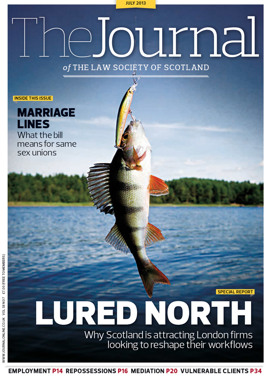President's column

Summer may be upon us, but the transformation of the legal agenda – discussed last month in the context of court closures, access to justice, reform of civil justice and contracting in legal aid – continues apace.
Since I last wrote, the Scottish Parliament’s Justice Committee has regrettably – and by only five votes to four – accepted recommendations to close 17 courts, a move the Society believes will damage access to justice and harm local communities. We will continue to lobby on this and will monitor the effect of the reform of court structures, particularly when the closures begin later this year.
Although all MSPs did not have the opportunity to debate and vote on the court proposals, other significant legislative business announced in the past month will be subject to full parliamentary discussion and scrutiny. Abolishing the requirement for corroboration in criminal cases, as put forward in the Criminal Justice (Scotland) Bill, has already attracted considerable attention, and criticism.
The Society fully supports a number of measures in the bill – for instance, new safeguards for vulnerable suspects, the introduction of police bail, and a reduction in the maximum detention period without charge to 12 hours – while remaining seriously concerned that removing the need for corroboration could lead to a greater risk of miscarriages of justice.
Some concerns about juries have been recognised with the proposal to move from a simple majority to a weighted majority, but we do not believe this is sufficient to remove the risks created by abolishing corroboration. Everyone wants a criminal justice system that is modern, fair and effective. Equally, it is important to recognise that corroboration is a fundamental principle of that system rather than an antiquated, outmoded legal notion. Just because corroboration is a distinctive feature of our system and not of many others, does not mean that it is wrong and should be washed away.
The Senators of the College of Justice, Faculty of Advocates and Scottish Law Commission have all urged that corroboration is retained – at least until there has been a proper examination of its place within, and implications of its removal on, the criminal justice system as a whole.
The Society is considering the bill in detail and will seek assurances that removing the need for corroboration will not lead to a deficiency in either the quality or sufficiency of evidence presented in court.
They consult, we consult
Also at Holyrood, the Scottish Parliament passed its first tax bill in more than 300 years. The introduction of the land and buildings transaction tax to replace stamp duty land tax was welcomed by the Society. However, we have asked for clarification on a number of points. As it is the first substantial tax introduced by the Parliament, the experiences and knowledge of solicitors will no doubt play a key role in developing a system that is fair and understandable for taxpayers, as well as being accessible, slick and easy to use for solicitors.
There continue to be some very significant changes in prospect on the justice agenda at Westminster too. The UK Government has to decide, by next May, whether to opt out en bloc of 130 police and criminal justice measures in the EU treaties. Included within these measures are essential weapons in the cross border crimefighting armoury such as the European arrest warrant. There would of course be the option of “opting back in” to an undisclosed number of measures, which would potentially require individual – and therefore lengthy, costly and uncertain – negotiation. For my part I would rather have a large box of Thorntons premium selection (not all of which I would like), than a small handful of Woolworths pick and mix (all of which I think I might like, at least at the time).
The matter was discussed at a House of Lords EU Committee seminar; great quality of input and a privilege to attend, but a really worrying lack of clarity on the part of the minister as to exactly how and when consultation would take place on what will be a fundamentally important issue, and one on which a decision must be taken in only a few months. I am left clinging to the fervent hope that this will not be a politically motivated decision but one taken after the necessary weight of consultation and deliberation. If there remains sufficient time…
A link to the seminar, which was filmed, is here: bit.ly/10uD7WL
At the same time as all this parliamentary activity, the Society launched an important consultation of our own – on the rule changes that would bring about separate representation of borrowers and lenders in property transactions. It is vital that solicitors, and others, contribute fully to this debate – which also features on p 40 of this issue – before the 21 July deadline. I urge you to do so by visiting the Society’s website at bit.ly/12gJFWa
In this issue
- Credit hire: back to basics
- You know who I mean
- Behind all the fun
- Your Future in Law
- Reading for pleasure
- Opinion column: Cameron Fyfe
- Book reviews
- Profile
- President's column
- Mapping out the Crofting Register
- Back office bait
- Another bite at the cherry
- Security of your home
- Marriage redefined
- Building better business cultures
- Keeping a rein on child cases
- Minimum gain
- Beware LLP tax changes
- Framework remodelled
- Scottish Solicitors' Discipline Tribunal
- A Scottish ILG chair in New York
- Beneath the surface
- Being alert to the needs of the vulnerable
- Sins of our leaders
- How not to win business: a guide for professionals
- Litigation: a tight ship?
- Ask Ash
- Why sep rep?
- From the Brussels office
- Law reform roundup
- Diary of an innocent in-houser






